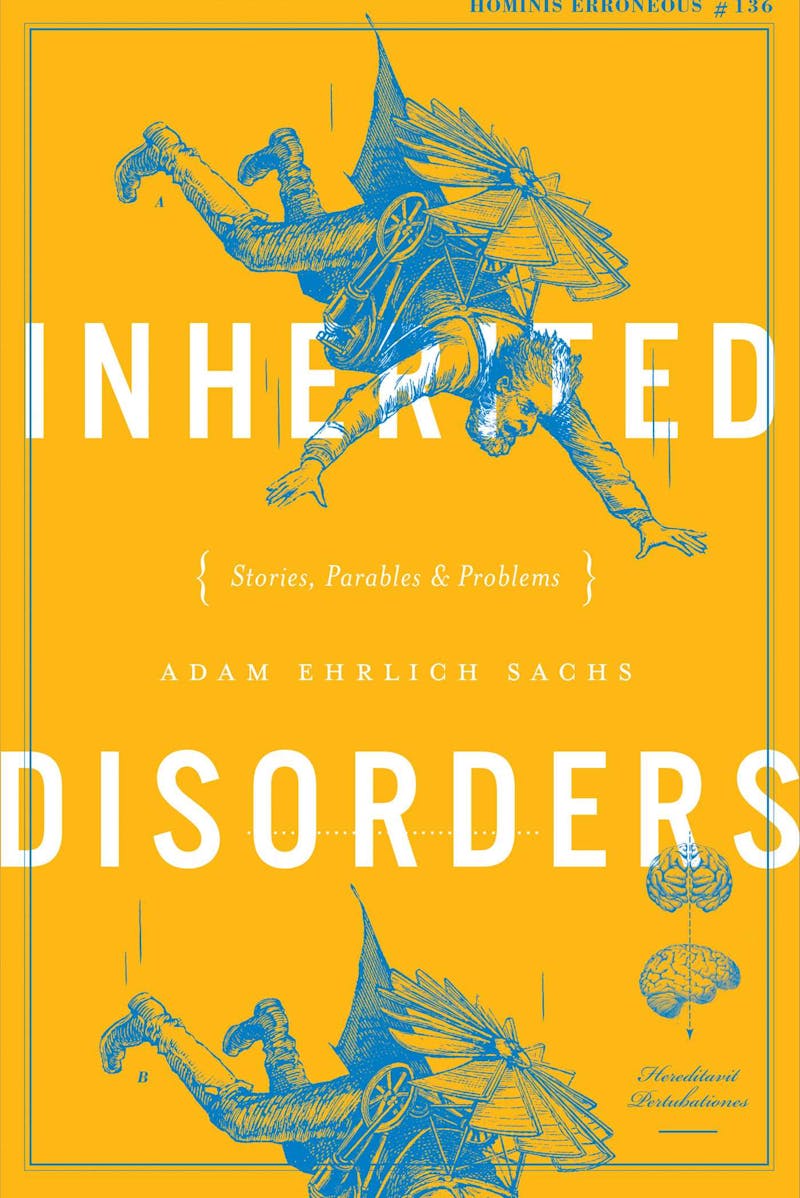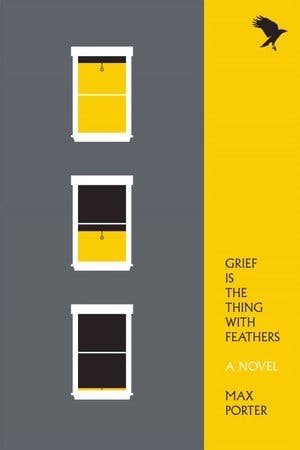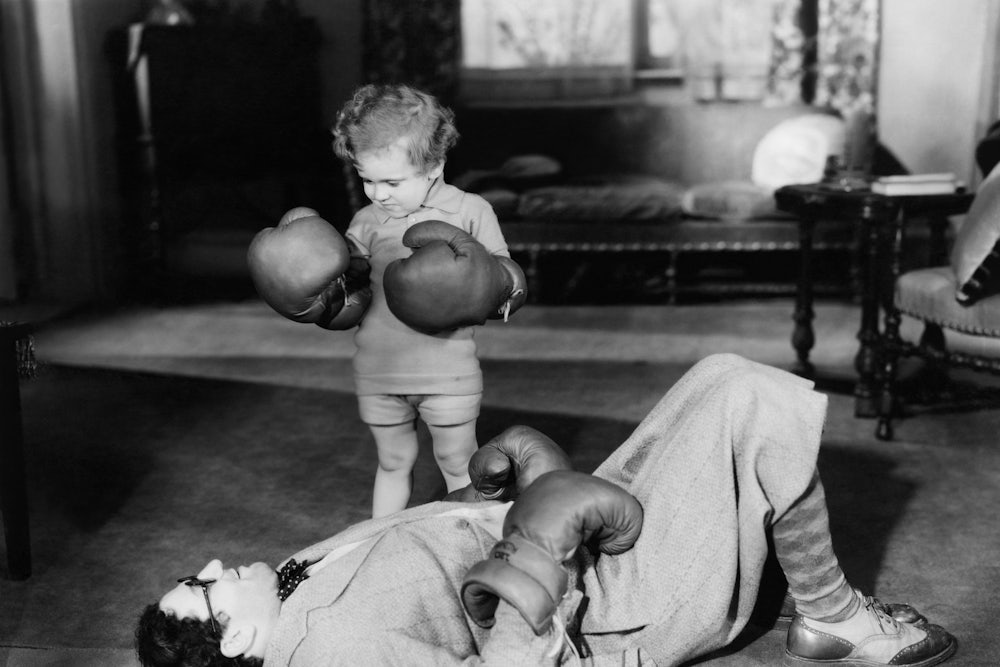Family crisis and disunion, bereavement and loss, and strained interactions between parents and their children: Max Porter’s first novel and Adam Ehrlich Sachs’s debut collection of stories have enough in common that reading them back-to-back is like coming across two strikingly dissimilar portraits of the same sitter. You marvel that the same starting materials could produce such different things. Most of the 117 very short comic stories that make up Sachs’s Inherited Disorders deal with sons who undo themselves to avoid becoming like their fathers. Porter’s Grief is the Thing with Feathers, a strange, arresting book that flits between a small cluster of narrators, centers on a recently widowed father and his two preadolescent sons.
Like anthologies of fables, both books unfold in brief, compressed scenes shorn of the descriptive embellishments one might expect from other kinds of fiction. Something else, too, has been subtracted from the worlds of these books: Women feature in them as defining absences or foils, but not as main characters. The families they depict are units of men and boys who tend to bury or only indirectly suggest their strong attachments to one another. These are stories in which fathers and sons worry over their masculinity, which, for the sons, often involves worrying over what they let their fathers pass down to them.
Sachs’s and Porter’s books belong to an eccentric body of fabular father-son fiction preoccupied with questions of descent, fate, and shame. An important touchstone for them both is “The Judgment,” Kafka’s 1912 story about a widower who drives his sensitive son to suicide. (In one of Sachs’s funniest, grimmest stories, a young writer attempts to pass off this story to his father as his own work.) Another forerunner is Donald Barthelme’s 1970 story “Views of My Father Weeping,” in which a son imagines dozens of versions of one embarrassing encounter with a “fatherly” figure after the older man’s sudden death. The story, with its many variations, suggests that family relationships between men might be like mathematical functions with sets of possible inputs and outputs.
While Sachs’s book turns that thought into a kind of guiding
principle, Porter suggests a less orderly picture of how fathers and sons
interact. Are father-son relationships, these books ask, best understood as ingenious,
structurally elegant inheritance puzzles, or as erratic phenomena with
structures too complex to make out?
Sachs, who recently turned thirty, tends to describe books of fiction as sets of problems that beg to be worked out in definite ways and with consistent procedures. The third-person narrator of his short prose piece “A Writer’s Justification” (not included in this collection) makes the radical and mischievous claim that “one can read an entire novel, even a canonical novel, even all canonical novels, without coming across any actual writing, just puzzle after puzzle, formulated and solved.”

The stories in Inherited Disorders aren’t sorted in a subject index, but they would have lent themselves well to one. There are many deathbed scenes: a nasty fable in which each successive scion of a food dye fortune learns from his dying father that the family product “explodes hearts,” then chooses to cover up the secret; a cautionary tale about a dying Norwegian playwright who wrongly assumes his unpublished manuscripts will start a family feud; a story about three terminally-ill philosophers determined to prove their career-validating theories to their skeptical sons. Elsewhere we find stories about artists who copy their famous fathers, and several stories in which characters swap roles. In “The Inverted Pyramid,” for instance, an acrobat and a mathematician trade their dynastic duties, with fatal outcomes for both families.
There are even stories about sons who make their own compilations of father-son confrontations. In “In a Vat,” a crazed scientist keeps feeding new father-themed memories into a floating brain. It would come as a shock to his actual father, who “lives literally right around the corner,” that “his son actually uses his brain-in-a-vat to simulate thousands of encounters between fathers and sons.” Writing fables gives Sachs, like the neuroscientist in that story, a certain freedom. In an interview with the New Yorker, he described his experience trying to write a more conventional novel: “I would start with a father and a son arranged in some extremely ironic configuration, as in these stories, but then I would make the son sort of amble over to the father, in a realist mode, and say something, and the novel would fall apart.”
As Sachs imagines it, sons are practically predestined to justify or emulate their fathers: an architect father produces a negligibly different architect son; a passive “fernpoet” nonetheless can only write about his father’s war crimes; an actor’s one-man show, which he insists will “destroy” his dentist father, inevitably is received as “an extraordinarily tender portrayal of a skilled dentist and loving family man.” Much of the book’s comedy is in Sachs’s way of treating these fraught relationships as if they were systems with rule-governed outcomes to be modeled and graphed—“puzzles,” as he put it in “A Writer’s Justification,” “that admit of solutions.”
A British writer and editor in his mid-thirties, Porter is interested in precisely those aspects of fatherhood that elude being modeled or solved. Grief Is the Thing With Feathers stays immersed in the experience of a single family struggling to adapt to a traumatic but irrevocable outcome. To an extent Sachs rarely does, Porter dwells on the particular qualities—the details of color and texture and tone—of the people and places in the book’s universe. In this case, those elements consist of an unnamed middle-aged Ted Hughes scholar, his two young sons, the house they shared with their late mother, and the enormous talking crow that shows up on their doorstep one night to preside over their grief.

The book begins shortly after his wife’s death from the unspecified complications of a head injury. Each of the novel’s short chapters—attributed variably to “Dad,” “Boys,” or “Crow”—shifts the action away from that event at irregular intervals. If Sachs sometimes reports his stories’ action like a bullet-pointed list of events, Porter is interested in how time seems to drag and speed up to a person under grief or strain. In a wonderful passage, Dad relates the first time, “about two years afterwards,” that he brought home a woman, “a Plath scholar I met at a symposium.” He can’t suppress his guilt when they make love clumsily “on the sofa my wife bought, drinking wine from glasses my wife was given, beneath the painting my wife painted.” When the unnamed woman leaves, he says, “I felt nervous about feeling cheerful. I walked around the flat as if I’d just met it, long strides and over-determined checking of surfaces.”
Grief is the Thing with Feathers is full of moments like this, in which instances of humor surge up from an atmosphere otherwise dominated by stillness and loss. A worried, responsible father, Dad rarely permits himself an outburst. The tone of the Boys’ shared voice ranges less widely: Sometimes they speak jointly (“we used to play a game called Sonic Boom”) and sometimes singly (“my brother always uses diagrams to explain our choices, but they aren’t scientific, they’re scrappy”). The contrast between their voices and Dad’s finer-grained, more worked-over one is the sort of thing that, had Sachs attempted it, would have made Inherited Disorders “fall apart.” It becomes Porter’s way of doing what the dialogues in Sachs’s abandoned realist novels would have done—capturing not only the puzzle of a father-son interaction but also its music, its varied and unpredictable textures.
Crow’s voice is the loudest and the strangest in Porter’s book. It is all irreverence and disruption. Yet something about this creature’s irreverence—even his nastiness and abrasiveness—gives him a special power to help Dad and the Boys cope with their loss. It hardly matters whether he’s a figment of Dad’s imagination or a kind of manifestation of the family’s grief. He knocks on the family door soon after the death of the Boys’ mother and at the height of Dad’s obsession with Crow, the strange, dark collection of poems Hughes published seven years after Plath’s death. Crow’s job, as he himself describes it, is to minister to the family in a way that flesh-and-blood mourners wouldn’t be equipped to. “In other versions I am a doctor or a ghost,” he says soon after his arrival. “We can do things other characters can’t, like eat sorrow, un-birth secrets and have theoretical battles with God. I was friend, excuse, deus ex machina, joke, symptom, figment, spectre, crutch, toy, phantom, gag, analyst and babysitter.”
A soft-hearted bully, Crow often goads Dad and the Boys into a dynamic based on a sense of their shared manliness: watching the kids tear through the house, Crow compares them to “blood-drunk fox cubs”; after his night with the Plath scholar, Dad confesses, he came downstairs to find Crow “on the sofa impersonating me pumping and groaning.” Under his management their household becomes a kind of boys-only club, sometimes an aggressive one. The shortest entry in the book is from Dad: “The boys fight.”
Porter’s vision of fatherhood comes off as more expansive than Sachs’s. It can assimilate more of the contradictory signals and odd, unsystematic episodes that being in a family actually involves. Late in Grief is the Thing with Feathers, one of the Boys gives a vision of his adult life:
Once upon a time I am grown up, I have a child. And a wife. And a car. I sound a bit like Dad. We drive through the Chilterns, the Downs, the Moors, the Broads, singing British Holidays for British People. My Dad did that, he showed us Britain… Now my tiny son shouts ‘cra’ when he sees a crow, because when I see a crow I shout KRAAAA.
The Boys might not amputate their fingers or fly into cyclones or expose themselves in public to resist their father’s influence, as certain of Sachs’s characters do. But they will take their kids on the same vacations on which Dad took them; they’ll play the same albums; they’ll sound “a bit like” him. And when their son makes a noise, they won’t be able to resist showing that they can make a louder one.
